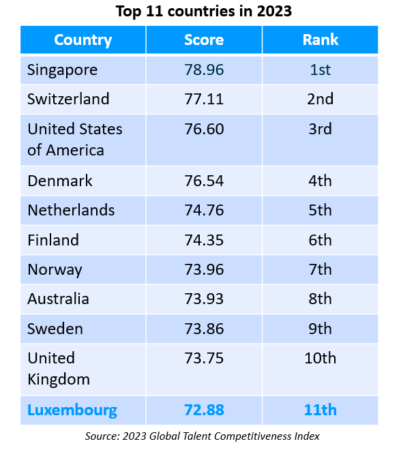

Luxembourg retains top position in global talent hierarchy
In the 2023 Global Talent Competitiveness Index released on 7 November by business school INSEAD, Luxembourg retained its overall 11th position and 1st position under the talent attraction pillar.
 Abigail Okorodus
Abigail Okorodus
 The INSEAD Global Talent Competitiveness Index assesses how different countries grow, attract, enable, and retain talent, the four key input pillars of the report. Similar to last year, the Grand Duchy maintained its 11th position globally out of the 134 countries assessed. However, its score improved from 71.58 in 2022 to 72.88 in 2023.
The INSEAD Global Talent Competitiveness Index assesses how different countries grow, attract, enable, and retain talent, the four key input pillars of the report. Similar to last year, the Grand Duchy maintained its 11th position globally out of the 134 countries assessed. However, its score improved from 71.58 in 2022 to 72.88 in 2023.
Since the launch of the index, Luxembourg has always been in the top 15 countries. In the current edition, Switzerland, Singapore and the United States rank in the top three positions respectively.
Luxembourg performs well across other pillars and sub-pillars
Attracting talent is considered from two angles: first, the capacity to draw in external resources such as productive enterprises via foreign direct investment (FDI) and skilled people. Second, internal attraction based on fewer barriers into the talent pool for disadvantaged individuals, women, and non-natives. Luxembourg leads the world under this pillar. The country ranks ninth, 13th and 22nd in terms of retaining, enabling, and growing talents. It also performs excellently well in other indicators and sub-pillars where it tops the global list, with notable examples including external openness, FDI regulatory restrictiveness, financial globalisation, international students, professionals, economic empowerment of women, tertiary education expenditure, and pension coverage.
Global trends
The report notes the strong presence of European countries in the top 25, where 17 nations are mentioned. “Beyond Europe – Australia, Canada, New Zealand, the United Arab Emirates, South Korea, and Israel join the top 25. UAE has moved up from 25th to 22nd while Japan dropped out, replaced by South Korea (24th),” INSEAD notes in a press statement.
The correlation between wealthier countries and talent competitiveness is again quite obvious. “Richer countries outshine smaller countries on the global talent stage,” observes Bruno Lanvin, Insead distinguished Fellow, Founder and President of Descartes Institute for the Future. Eight of the top ten this year were also in the top ten in 2013. The index also highlights that emerging economies are often among the best improvers, referring to China, Mexico, Indonesia, and Brazil.
Talent competitiveness by 2033?
Based on an accumulation of its data so far, six key predictions on what talent competitiveness could look like in the next ten years are outlined in the report:
- Talent competitiveness will gain even more importance as a critical element of competitiveness, innovation and geo-political soft power for nations, cities and organisations.
- Talent competition will grow fiercer. As uncertainties and international tensions will continue to accumulate (in trade, in investment, in politics and diplomacy), there will be growing talent wars.
- The world of work will further transform, driven by evolving expectations from younger generations, new economic models and emerging technologies like AI.
- Cities and regions will pioneer new talent strategies and innovation. Quality of life and sustainability will be a critical asset for those aiming at becoming talent hubs.
- Global talent-focused policies will be crucial to prevent tensions and harness human and technological potential for a better, more sustainable and equal world.
- Skills and education will remain vital tools to empower workers to make meaningful contributions to their economies and societies.
Photo credit: Unsplash







